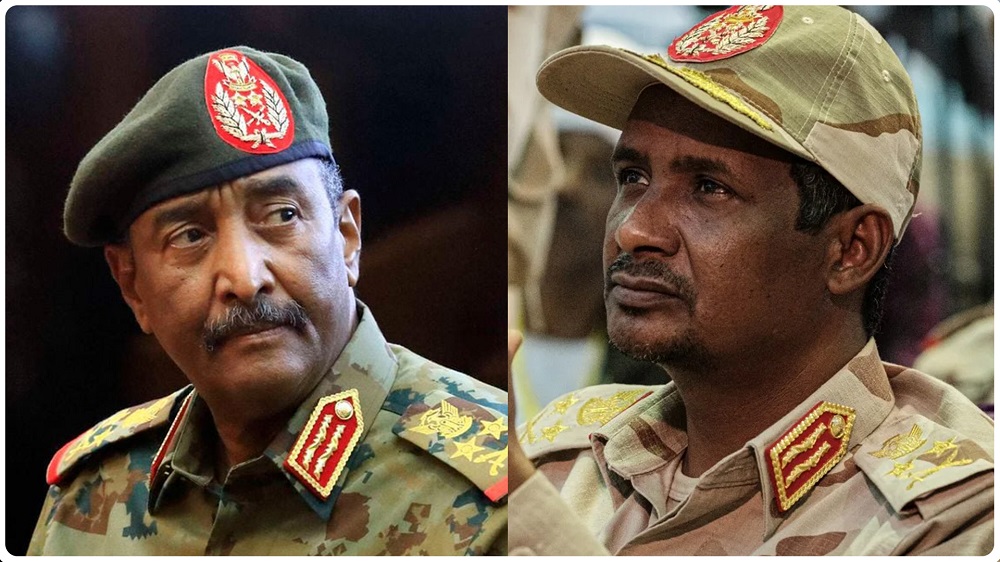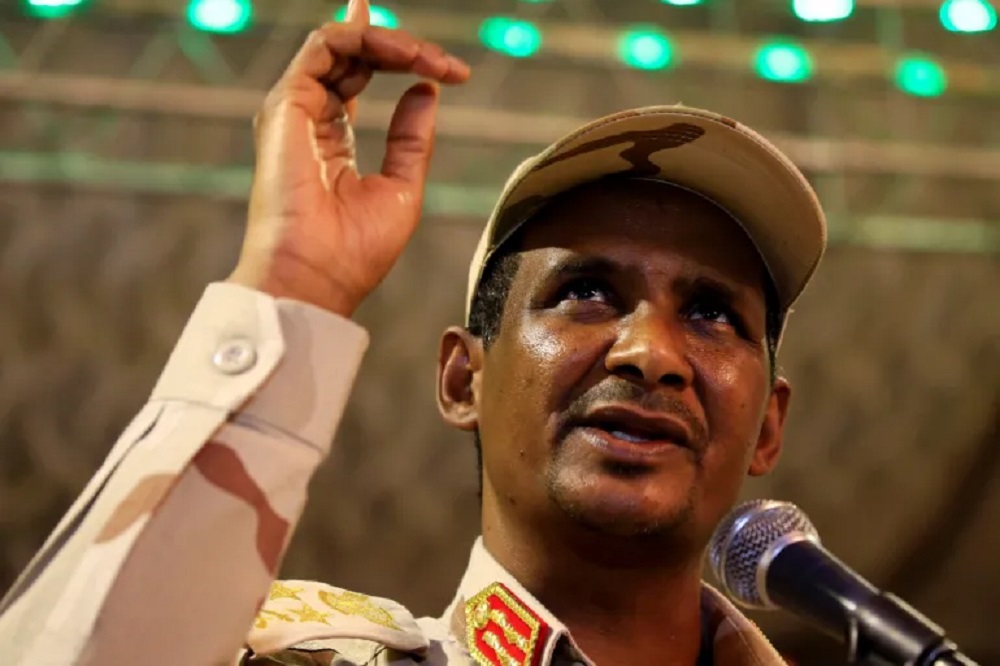Watan-In the spring of 2023, Sudan slid into a bloody armed conflict that erupted in mid-April between the Sudanese Armed Forces (SAF) and the Rapid Support Forces (RSF), plunging the country into the heat of prolonged military confrontations.
Over the course of these harrowing months, the balance of power has swayed between both sides, with alternating control of territories, battlefield victories, and heavy losses.
However, on March 28, 2025, the Sudanese army announced it had carried out airstrikes on RSF positions in El Fasher, confirming it had fully regained control of the capital, Khartoum.
This military success raises urgent questions across the country: Does this signal a fundamental strategic shift that spells the imminent and total defeat of the RSF? Or are these merely fleeting victories, subject to reversal in the days ahead?
Amid these developments, the Sudanese army reclaimed the Republican Palace and sovereign ministries in Khartoum—an event with major symbolic weight.
But does this control represent the genuine restoration of state authority and institutions, marking a decisive turn in the war toward an inevitable conclusion? Or is it simply a powerful symbolic military achievement that doesn’t necessarily translate into full security or stability?

Negotiations or Total Collapse?
With these changing dynamics, the prospect of negotiations looms as a possible outcome, especially amid increasing talk of the RSF’s defeat. This in turn prompts an assessment of the remaining options for the RSF in this critical phase.
It is crucial to emphasize that any negotiation path will be dictated by the new realities brought about by the RSF’s battlefield setbacks—which now seem more than mere speculation.
Yet, even with a ceasefire, Sudan will still face deep-seated security and political challenges. Key questions emerge: How will the remaining RSF networks be dismantled? How can Sudan ensure violence doesn’t return?
As the RSF commander Mohamed Hamdan Dagalo (Hemedti) watches his forces crumble, he may seek a political exit—but his path is riddled with legal threats and growing public rejection.
Is the RSF Facing Collapse?
Recent developments raise questions about whether the RSF is on the verge of collapse, or simply undergoing a strategic repositioning.
Reports point to severe logistical challenges, including major casualties, disrupted supply lines, and attacks on ammunition depots. The RSF’s legitimacy has also eroded, as UN reports and international condemnations accuse it of war crimes. Regional support has waned, under international pressure.
Despite this, the RSF retains some capacity—especially due to logistical support from Chad—to regroup and continue fighting in Darfur, where it has traditional strongholds. A complete defeat remains uncertain, but the RSF is clearly strategically weakened, possibly on the path to fragmentation or transformation into a guerrilla force.
A likely scenario is that the RSF transitions into a decentralized rebel movement, akin to other militias in Africa, rather than remaining a unified military entity.
The RSF may see the army’s victories as temporary, driven by local or tactical shifts. Still, the recapture of key strategic sites in Khartoum, including the Republican Palace, represents clear military superiority.
This is more than a battlefield win—it carries political and symbolic meaning, reaffirming central state authority.
Controlling these sites allows the army to resume some administrative functions, even if limited at first. The morale boost for the army is significant, while the RSF’s morale has declined.
This could pave the way for a gradual return of government institutions to the capital.
Political Process: Still Essential
However, real stability will require a comprehensive political process involving all stakeholders to build good governance and ensure Sudan’s future.
Core questions remain: What will post-war governance look like? How can national reconciliation be achieved? Can the army manage political consensus to ensure lasting peace?
Looking ahead, observers question the RSF’s negotiation options in the event of a full surrender. But defining these options is challenging, as they depend on changing battlefield realities.
In general, negotiations from a position of defeat mean the RSF is no longer strong enough to dictate terms. They may instead aim to:
-
End the fighting and reduce losses
-
Retain partial control over some areas or troops
-
Negotiate safe withdrawal or surrender terms
-
Seek immunity for commanders
-
Secure minimal political or security concessions
Their options may include:
-
Direct negotiations with the army for conditional surrender, including disarmament, reintegration, or guarantees for members
-
Mediated negotiations through the African Union, UN, or regional actors, offering more room for maneuver
-
Shifting alliances or seeking new backers, perhaps hoping to rebalance power or join broader coalitions
All these depend on the army’s stance: whether it chooses to push for final victory or prepare for a long guerrilla war in Darfur.
Is There a Political Exit for Hemedti?
Hemedti’s political future seems bleak. With his forces suffering repeated defeats and war crime charges mounting, legal and political pathways are closing rapidly.
Sudanese political and military forces insist he must step down and be held accountable, making any political deal dependent on major concessions.
So far, the army and its allies appear to favor a complete dismantling of Hemedti’s influence. He is wanted by the International Criminal Court for crimes in Darfur, and faces widespread public rejection.
Still, there are limited, complex scenarios—such as seeking safe exile through regional mediation in exchange for a phased withdrawal, similar to outcomes seen in other African conflicts. Yet even this is uncertain: What country would accept hosting him under these conditions?
Challenges Ahead and Lessons Learned
Post-war Sudan faces immense security and economic challenges that require sustainable, long-term solutions.
The two most pressing are:
-
Dismantling remaining armed networks
-
Rebuilding the devastated national economy
These challenges are interconnected. Addressing them requires a holistic strategy that promotes security, institutional strength, economic reform, and national reconciliation.
One major threat is the proliferation of weapons among civilians and ex-combatants, which could lead to criminal violence or tribal militias and resource-based conflicts.
Dismantling armed groups is complex due to their hidden nature, geographic isolation, and difficulty distinguishing between fighters and civilians.
Sudan’s army and security forces lack the resources and capabilities for effective disarmament and may face armed resistance during operations.
A successful approach will require a multi-pronged strategy combining military action, reintegration programs, and economic development, along with regional and international cooperation to combat cross-border threats.
Final Thoughts
This war is a grim reminder of the devastating cost of armed conflict and the urgent need to prevent it in the future.
Many critical lessons can be drawn: chiefly, the importance of building strong and functional institutions as the foundation of stability and sustainable development.
Sudan may face similar crises again unless root causes are addressed—including irresponsible foreign interventions that fuel instability, and socioeconomic hardships like poverty and unemployment that drive tensions.
Avoiding future tragedies requires strengthening good governance, justice, equality, and inclusive dialogue among all parties.
And above all, the political, economic, and social roots of conflict must be resolved through deep reforms, while foreign powers must refrain from interventions that only escalate suffering.
